Leadership and the new science : learning about organization from an orderly universe / Margaret J. Wheatley.
Material type: TextPublication details: San Francisco : Berrett-Koehler Publishers, 1992.Description: 164 p. : ill. ; 22 cmISBN:
TextPublication details: San Francisco : Berrett-Koehler Publishers, 1992.Description: 164 p. : ill. ; 22 cmISBN: - 9781881052449
- 500 WHE
 Books
Books
| Current library | Call number | Status | Barcode | |
|---|---|---|---|---|
| Paro College Library | 500 WHE (Browse shelf(Opens below)) | Available | *10898* |
Includes bibliographical references and index.
Each of us lives and works in organizations designed from Newtonian images of the universe," Margaret Wheatley writes in this groundbreaking book. "Our assumptions come to us from seventeenth-century physics, from Newtonian mechanics. ... But the science has changed. If we are to continue to draw from the sciences to create and manage organizations, then we need to at least ground our work in the science of our times. We need to stop seeking after the universe of the seventeenth century and begin to explore what has become known to us in the twentieth century."" "Wheatley takes the reader on a mind-opening journey into the "new science"--The revolutionary discoveries in quantum physics, chaos theory, and molecular biology that are changing our understanding of the universe. And she applies these scientific concepts to offer new light on the fundamental issues of organizing work, people, and life, including: how can we find order in a chaotic world?; how is order different than control?; how can we create more participative, open, and adaptive organizations?; how can we reconcile individual autonomy and organizational control?; and what leads to organizational growth and self-renewal instead of decline and death?
There are no comments on this title.

